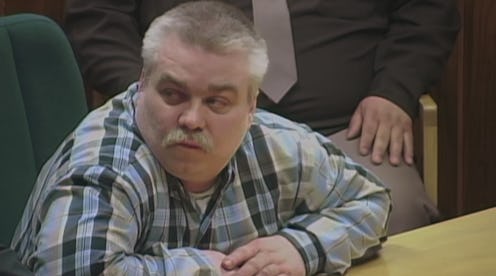News
Will This Test Exonerate Steven Avery?

If you've watched Netflix's documentary series Making a Murderer, or you've followed some of the high-profile coverage of the case since it came out in December, then I don't have to introduce the name Steven Avery to you ― he's the central subject of the documentary, currently serving a life sentence for the murder of 25-year-old photographer Teresa Halbach, for which he was convicted in 2006. But now, his new representation is making a play to get him out: Steven Avery's new lawyer wants advanced luminol testing that could potentially exonerate her client.
If you hadn't heard, Avery's not being represented by Jerry Buting or Dean Strang anymore, the high-profile defense duo who became breakout stars thanks to the documentary. Now, with Avery in the thick of his post-conviction legal efforts, he has a new lawyer in his corner ― Chicago-based wrongful conviction specialist Kathleen Zellner, who announced she was taking up Avery's case in January. Even before she'd officially joined up with him, however, she'd been strident in her defenses of him, once tweeting that whoever deleted a voice message from Halbach's phone prior to her body being discovered was "either the murderer or part of coverup."
So, here's the basic idea: Zellner wants — and although some reports have suggested she's already had the testing carried out, this isn't yet clear — to use what's known as a luminol test, to determine whether there was any otherwise visually undetectable blood present in the places where prosecutors argued Avery committed his grisly crimes. (Avery has always denied such crimes.) When luminol comes into contact with blood, it illuminates it in a bright, glowing blue hue.
According to the Minnesota Bureau of Criminal Apprehension, "Scientists can take advantage of the luminol reaction to locate potential blood evidence that would be undetectable through visual examination." Here's an example of what it looks like, from the bureau's official website.
Pretty striking, huh? While it's too early yet to say what luminol testing will turn up in Avery's case, and how Zellner will use it, the implications are pretty clear ― if no such blood is seen in Avery's bedroom and/or garage, it calls into severe doubt the theory of the case presented by the prosecution. Simply put, both by virtue of the heightened attention Making a Murderer has shone on Avery's case, and the aggressive work by Zellner, there could be some honest-to-goodness headline news on all this coming in the near future.
As it stands now, Avery is serving a life sentence without possibility of parole. His nephew Brendan Dassey, who was also convicted of killing Halbach despite many advocates believing his confession was false and coerced, is eligible for parole in 2048. But for Avery, the only way to ever taste freedom again is to find some new evidence to secure a new trial, or an outright exoneration. And at the very least, it sounds like he can feel good about having Zellner in his corner ― according to her website, she's overturned the wrongful convictions of 17 other men throughout her career.
Image: Making a Murderer/Netflix; Bureau of Criminal Apprehension